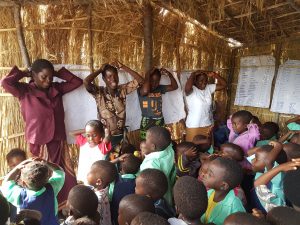Why Kindergarten?
“Giving children a good start through kindergarten not only counters the worst effects of poverty, but may also be the most effective means of halting cross-generational poverty. When equity in access to early education and learning is improved, greater economic benefits accrue to individuals themselves and collectively to society.” United Nations Children’s Fund: New York, Updated in April 2012
Why Kindergarten Investment through Project Kindy?
“It is better to light a candle than to curse the darkness.”
Project Kindy is a small candle, but it shines brighter every day as more of you join our Village to make a tangible, longlasting impact in the lives of kindergarten children and their families suffering extreme poverty in Africa. We fundraise in Australia to empower remote communities in rural Malawi to run their own kindergartens within the management and supervision of the Canossian Sisters. Project Kindy is Empowering and Efficient and we hope you will join us as a monthly donor, social media advocate, guest at our events or as a partner in fundraising efforts through other channels such as your business, organisation or school.
Empowering
“We should not think only in terms of economic growth when we try to understand poverty reduction. It is vital that we work to empower poor people to participate in the process. Empowering poor people so that they can participate in economic growth requires investments in health, in education, and in social protection as well as building institutions that enable them to participate in decisions that shape their lives.” World Bank chief economist, Nicholas Stern
With over 40 years of experience in charitable work in Malawi, Sr Josephine Allieri has seen firsthand why kindergarten is the best way to help improve lives within a partnership model between donors and beneficiaries. As active leaders and participants our communities avoid the pitfalls of long term, passive receivership and are growing in skills and confidence as they progress towards their own goals of changing the lives of their children, community and country through education.
Crucially, the village leaders, teachers and parents consistently and enthusiastically show why kindergarten is so important to them. They also stress to us that they see education as the way forward and the children are thirsty for knowledge and experiences. This integrated support between community, parents and kindergartens is a key factor in the success of the kindergartens.
“The three dimensions of school readiness are: Ready Children – children’s learning and development; Ready Schools – support a smooth transition for children into primary school; and Ready Families – parental and caregiver attitudes and involvement in their children’s early learning and development and transition to school. All three dimensions are important and must work in tandem, because school readiness is a time of transition that requires the interface between individuals, families and systems.” United Nations Children’s Fund
How do the Malawian Villages collaborate with the Canossian Sisters and Project Kindy? The day-to-day effectiveness of the kindergartens relies on the leadership, generosity and hardwork of the local Malawian teachers and parents and the enthusiasm of the children:
Firstly, the head chief and sub chiefs initiate the establishment of the kindergarten, give approval for the teachers and the location and construction of the shelter within the village, form a Parents and Citizens committee and send a Sub-Chief to Sr Josephine for monthly support meetings.
Secondly, the parents contribute a great deal. They give small fees when they can as well more ingredients for the lunches such as groundnuts or salt. They build the temporary structure from sticks and/or mud and often make their own bricks in the hope of receiving help to build permanent buildings. The mums walk their children to school and stay for the duration, giving enthusiastic encouragement to the children as they learn.
“Parents’ education goals for their children and their beliefs, attitudes and commitment to education are considered to be crucial for school success.” United Nations Children’s Fund

Thirdly, the teachers provide life-changing development across literacy, numeracy and social domains, giving the children the incredible gift of school readiness. Critically, they teach the children literacy and numeracy in both English and Chichewa (Malawi national language), emotional and behavioural skills and they provide a fun, caring and safe place for children to learn. Your donations provide incentive bags of grain to thank and compensate these men and women. Your donations also empower each kindergarten to employ a cook to provide crucial nutritious lunches for the students.
“In environments characterised by poverty, the problems of learning are compounded when the language used in school is not a child’s first language, and the chances of dropout increase correspondingly – particularly affecting, for example, low-income, minority and vulnerable children. Multi-lingual kindergartens mitigate this risk.” United Nations Children’s Fund
Finally, the children themselves walk a long way to kindergarten and are ready and eager to learn and their smiles clearly show why kindergarten is worth investing in. Our kindergartens reach children in remote areas and give them a head start with English and maths and behavioural/social skills, which are key factors for their future success at school.
Project Kindy aims to optimise the outcomes for our beneficiaries with the most streamlined, inexpensive operational strategies for fundraising.
- 100% of your donation is transferred directly from our Project Kindy Bank Account to the Canossian Sisters’ Bank Account strictly for the purpose of covering kindergarten fees at 10 rural kindergartens in rural Malawi.
- Our annual budget is very specific and covers food and transport costs. For instance, we know your donations buy 400 x 50kg bags of corn for the year of lunches.
- We operate online, reducing time and expenses.
- Project Kindy fundraising events are a collaborative effort. We gratefully accept fundraising support from individuals and organisations who run their own campaigns and events for our beneficiaries.
We want you to feel that Project Kindy is worth your time and/or money and to know why kindergarten investment directly impacts on people in need in Africa for a very long time, making your contribution a very meaningful and enjoyable one.

Join our Village and add your light and help us burn brighter!


